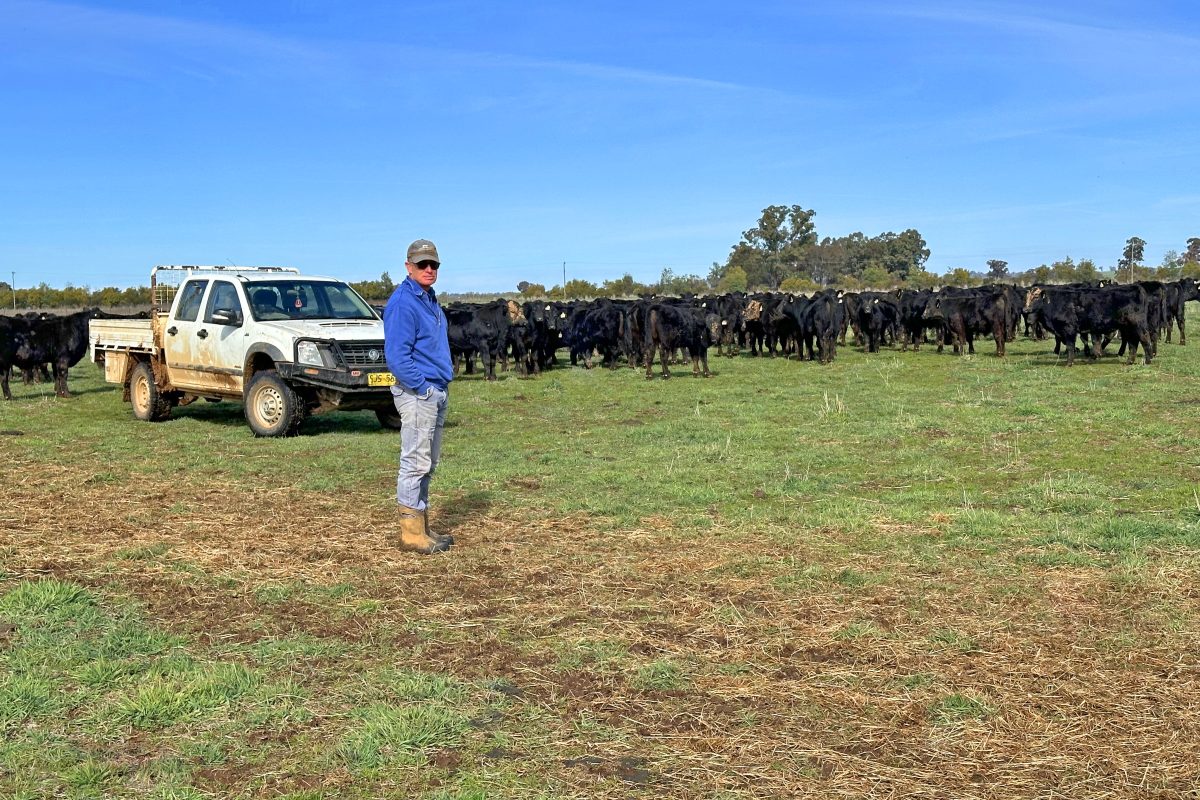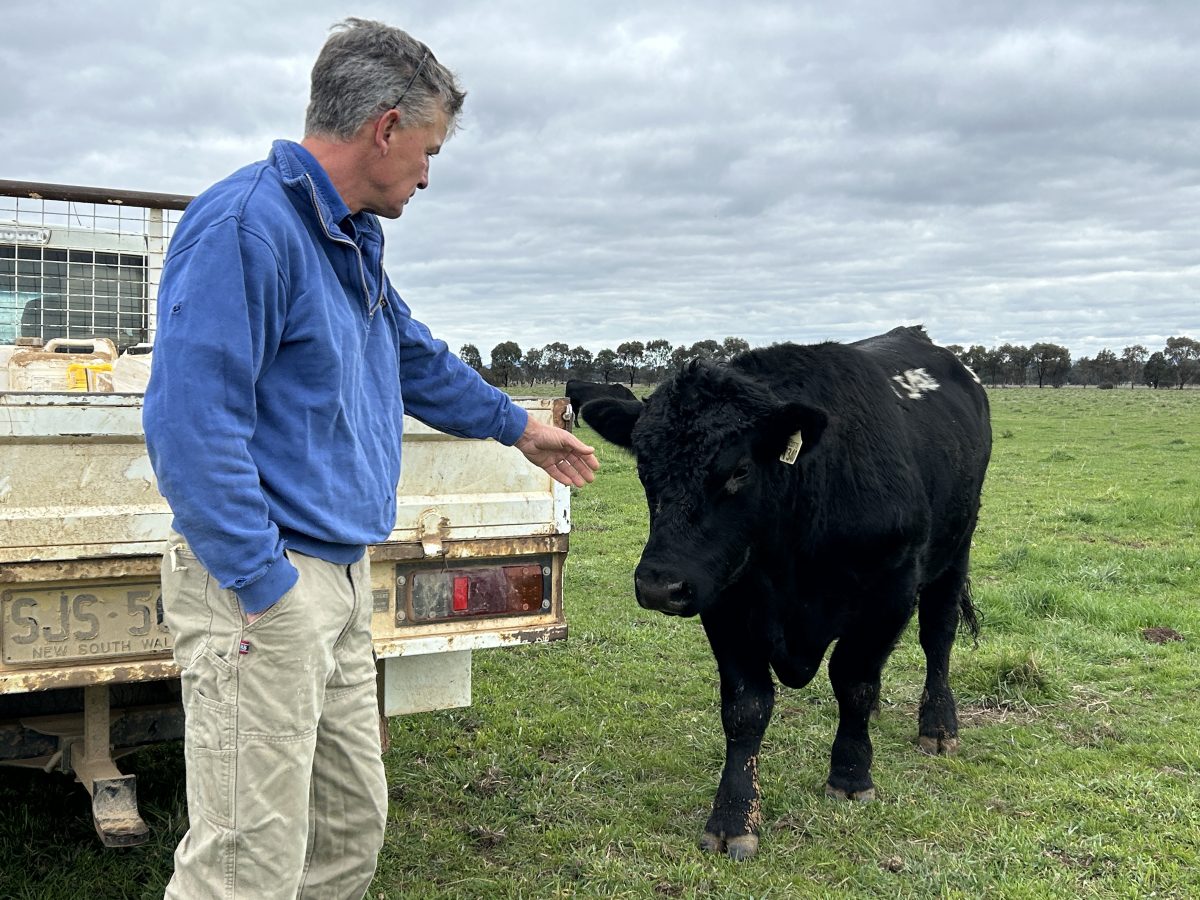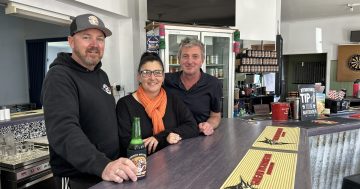
Beef producer Steven Scott is preparing to run three marathons in the next few months, culminating with the world-famous New York marathon in November. Photo: Ian Cossor.
There are a lot of things going through beef producers’ minds at the moment, most notably the preparation for the upcoming bull sales season which kicks off in Spring.
For Angus breeder Steven Scott it’s that, and a few other things; including if he’s going to be ready to run the New York marathon come 3 November this year.
As the sixth-generation farmer from Henty gets ready to promote some 230 Angus bulls to cattle breeders from around the country, he’s also in training for the City2Surf Fun Run in August and the Sydney Marathon in September.
He draws parallels between running and life; the mental preparedness required for a long-distance marathon can be handy for running a significant cattle breeding enterprise.
“If you want to have an understanding of running, run a mile, if you want to have an understanding of life, run a marathon,” he says.
“Because it’s a long journey, it requires preparation and thought, a lot of things can go wrong and you learn to break it down into manageable bite-sized chunks.”
Steven and his wife Cindy operate Glen Elgin, a 2400-hectare farm 20 kilometres west of Henty. They have a measured approach to breeding cattle which includes increasing the biodiversity on their property as well as offsetting the carbon they produce.
They are happy to be outside the norm and to do things a little differently.
Unlike most other producers across the Riverina they do not hold an annual on-farm auction of their bulls, preferring instead a one-on-one approach where they can give individual clients their undivided attention.

Steven Scott (blue singlet) says running a marathon in cities such as London and New York can bring on mental fatigue due to all the sightseeing opportunities along the way. Photos: Supplied.
“It’s a system that can be intensive, but it works well for us. We’ve developed relationships that often means the next time they come they might bring a neighbour or a friend,” said Steven.
As a result, they avoid the stress of the auction day excitement and don’t have to sort the serious buyers from those attending for a social occasion. It also means that the person in the vehicle who has taken the time to come to Glen Elgin is almost guaranteed to invest in their breeding program.
“I went to a sale 20 years ago and we bought the second top priced bull and I have still not had contact from the vendor. That was my take home, you are so busy on those days and you’ve got so many people to talk to you can’t give someone your full attention.
“Selling bulls privately is client friendly. We could go to a production sale but our clients like being the only person in the yards.
“When they come here, they say, ‘Thanks for penning the bulls’ and I say, ‘That’s my job.’
“You can spend a lot of time farming where you don’t get paid. If you’re a grain grower you get paid once a year, if you’re a dairy farmer you get paid once a month, if you’re a livestock farmer you’re somewhere in between.”
They assess, reassess and seek external assistance and advice to help with their operations. They benchmark against others around Australia and take advantage of new innovations such as the SmartAgSystem app to help with training, risk mitigation, human resources and on-farm day-to-day management.
Environment is also at the forefront of their minds.
“My forebears came in and did what they had to do, they left one tree in a paddock for a bit of shade because mob sizes were a lot smaller in those days,” said Steven.
“Now at Glen Elgin we are putting tree 30-metre corridors throughout the farm and trying to bring back biodiversity.
“We are aware of beef’s role in the carbon debate and we are mindful that the more bulls we sell, the more work we can do to offset the methane that we produce. It’s a paradox; whatever we are doing we are fortunate that we are making enough money from the bulls that we can put back, we can plant trees.
“We are planting somewhere around 50,000 to 100,000 stems of endemic native trees and shrubs a year and we’ve been doing it for about 20 years.
“It’s very satisfying to track the changes on Google Maps and say, ‘We did that.'”
Ongoing professional development and education is paramount to the Scotts’ livestock enterprise.
“There are so many facets to think about. Agriculture is a vibrant space and you’ve got to keep on top of it,” said Steven.
He likes to quote Tim Minchin. One of his favourite’s is, “Science adjusts its views based on what’s observed”.
“There are so many nodes of knowledge out there. If you turn your back and say, ‘No, that’s not happening’ because it makes you feel more comfortable to not acknowledge it, you are not growing, or as Tim Minchin says, ‘Faith is denial of observation so that belief, comfort or order can be preserved’.
“I think about that one quite often.”
Last year Scotts Angus sold 200 bulls; this year there’ll be 230 up for grabs. Five years ago there were 120 sold.
Steven says they are about at their limit with the current system they have without having a production sale.
“Do I want to increase? Yes, is it sustainable? I don’t know.
“If you work on the fact a single bull with a possible delivery might be a day’s work, if you sell an extra 50 bulls there’s 50 days of work you’ve possibly got that you get paid for, but there’s possibly other jobs that you might not be getting done.
“I reckon we’ll be doing OK if we keep selling this many bulls a year.”

Temperament is one of the key qualities that Scotts Angus ensure in their bulls. Photo: Vanessa Hayden.
In the meantime, it’s very early mornings for Steven.
He awakes at dawn before everyone else, not to tend to the herd, but to strap on his sneakers and hit the dirt and bitumen around Glen Elgin and the back roads of Henty.
“On one occasion I ran out to Pleasant Hills and back; it was one of those mornings when there was frost on ground, a fog layer above it and the sun was coming through and I was on top of this little hill and the view was incredible and I thought wow, it was so stunning.
“I came back and brought Cindy in a cup of tea and said, ‘Hey, Cindy you wouldn’t believe what I saw, I’m the luckiest bugger in the world I reckon’ and she says, ‘Steven, it’s 5 am, it’s freezing cold and frosty, you are the biggest idiot in the world I reckon,'” he laughed.
He’s excited about the upcoming competitions and thankful that he’s able to take the time to attend them, backed by a great farm team led by his long-time right-hand man Neale Terlich.
He’s also mindful that in marathons, just as in life, it will be wise to break down each run into achievable chunks.
“If you set out thinking you are going to run 42 km it could be overwhelming.
“If you set out thinking I can run a kilometre, when you reach that guidepost, great, now let’s just go another kilometre to the next guidepost. Before you know it, you’ve done it 42 times. It sounds simplistic but it’s a good mindset.”
When the dust has settled on the yards at Glen Elgin after this year’s bull sales Steven’s eye will turn keenly to the bright lights of New York.
“I’m so fortunate to be able to do this. It’s going to be very mentally stimulating, I’m a sightseer and when I ran in London I think I got mental fatigue from taking in all of the sights around me as I competed, I ended up running slower than I thought.
“In New York I’ll also have to be looking out for 50,000 other runners to start with, all those elbows and arms.
“I want to run quickly but how often am I going to be able to go through all those streets in New York; I want that experience, so does my time really matter in the end?”
To find out more about Scotts Angus visit Scotts Angus | Seedstock and commercial Angus beef production








